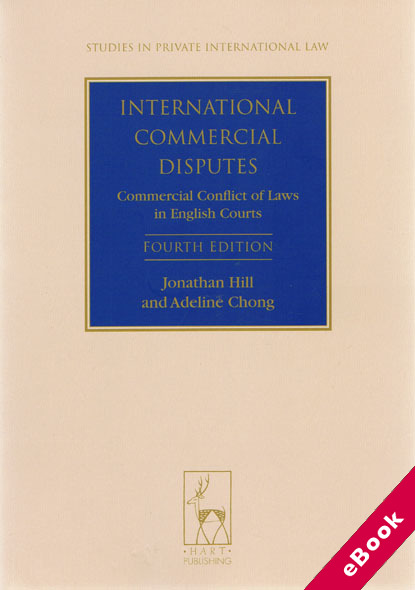
The device(s) you use to access the eBook content must be authorized with an Adobe ID before you download the product otherwise it will fail to register correctly.
For further information see https://www.wildy.com/ebook-formats
Once the order is confirmed an automated e-mail will be sent to you to allow you to download the eBook.
All eBooks are supplied firm sale and cannot be returned. If you believe there is a fault with your eBook then contact us on ebooks@wildy.com and we will help in resolving the issue. This does not affect your statutory rights.
This is the fourth edition of this highly regarded work on the law of international commercial litigation as practised in the English courts.
As such it is primarily concerned with how commercial disputes which have connections with more than one country are dealt with by the English courts. Much of the law which provides the framework for the resolution of such disputes is derived from international instruments, including recent Conventions and Regulations which have significantly re-shaped the law in the European Union. The scope and impact of these European instruments is fully explained and assessed in this new edition.
The work continues to be organised in three parts. The first part considers the jurisdiction of the English courts and the recognition and enforcement in England of judgments granted by the courts of other countries. This part of the work, which involves analysis of both the Brussels I Regulation and the so-called traditional rules, includes chapters dealing with jurisdiction in personam and in rem, anti-suit injunctions and provisional measures.
The work's second part focuses on the rules which determine whether English law or the law of another country is applicable to a given situation. The part includes a discussion of choice of law in contract and tort, with particular attention being devoted to the recent Rome I and Rome II Regulations. The third part of the work includes a new chapter on international aspects of insolvency (in particular, under the EC Insolvency Regulation), but mainly focuses on an analysis of legal aspects of international commercial arbitration.
In particular, this part examines: the powers of the English courts to support or supervise an arbitration; the effect of an arbitration agreement on the jurisdiction of the English courts; the law which governs an arbitration agreement and the parties' dispute; and the recognition and enforcement of foreign arbitration awards.